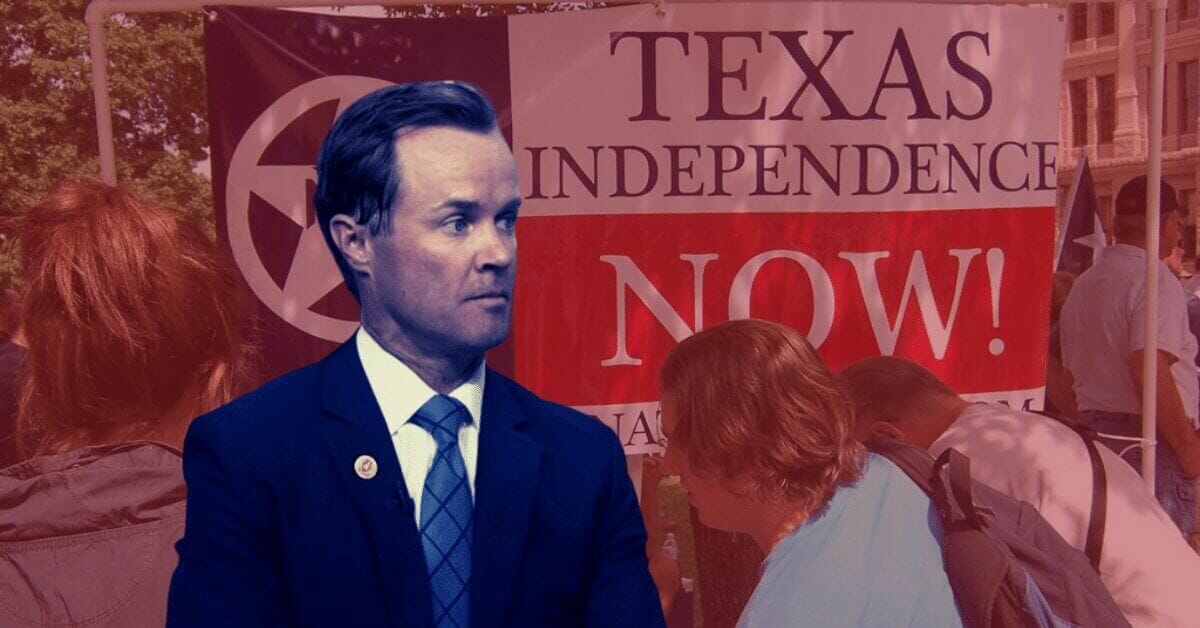Phelan’s legislation would cap out-of-state contributions after experiencing external spending during bruising primary
Former House Speaker Dade Phelan has filed legislation during the current special session that mirrors a policy the Texas Nationalist Movement has championed for over a decade, creating an unexpected convergence between establishment Republican politics and Texas sovereignty principles.
House Bill 141, filed July 21 by the Beaumont Republican, would impose strict limits on out-of-state campaign contributions to Texas races. The bill caps non-Texas donations at $5,000 for statewide contests, $2,500 for district-level races, and $1,000 for county elections.
The legislation represents a dramatic shift for Phelan, who historically benefited from external funding throughout his political career but faced millions in out-of-state spending aimed at removing him during his brutal 2024 primary runoff.
TNM’s Longstanding Position Gains Mainstream Support
The Texas Nationalist Movement has advocated for banning out-of-state campaign contributions since 2013, positioning such restrictions as fundamental to Texas sovereignty and protecting state elections from external manipulation.
“Only Texans should decide Texas elections,” has been a consistent TNM talking point, with the organization framing contribution limits as essential to reducing Texas’s political entanglements with outside forces.
Daniel Miller, President of the Texas Nationalist Movement, has long argued that external campaign funding represents a form of political colonization that undermines Texas’s ability to govern itself according to Texas values and priorities.
The organization supported Phelan’s identical bill during the regular session (HB 3592), which passed the House 118-21 in May before dying in the Senate.
Personal Experience Drives Policy Conversion
Phelan’s advocacy for restricting out-of-state money comes after experiencing its effects firsthand during his 2024 primary challenge from David Covey. The contest drew millions in external spending from national conservative networks seeking to oust establishment Republicans.
President Donald Trump, Attorney General Ken Paxton, and Lieutenant Governor Dan Patrick all backed efforts to remove Phelan from office, with outside groups pouring resources into the race. Covey, who pledged full support for a vote on Texas independence and aligned with TNM principles, drew significant funding from conservative donors across the country.
While Phelan narrowly survived the runoff, the experience apparently provided a education in how external money can destabilize incumbent politicians regardless of their ideological positioning.
The timing of Phelan’s conversion has drawn criticism from political observers who note the transparent self-interest in his newfound concern for Texas sovereignty. Having lost the speakership earlier this year amid Republican fractures, Phelan appears to be repositioning himself as a “Texas-first” reformer.
Unlikely Political Alignment
The convergence between Phelan’s legislation and TNM positions creates an unusual dynamic in Texas politics. The Texas Nationalist Movement has consistently opposed establishment Republicans like Phelan, viewing them as insufficiently committed to Texas sovereignty.
During Phelan’s primary, TNM-aligned voices indirectly supported Covey, who explicitly endorsed Texas independence and portrayed Phelan as too moderate and accommodating to federal authority. Phelan has expressed opposition to secession, though he indicated he would allow a legislative vote on independence if constituents demanded it.
The alignment demonstrates how Texas Nationalist Movement principles increasingly influence mainstream political discourse, even among politicians who reject the ultimate goal of independence.
“The fact that establishment figures like Phelan feel compelled to adopt very public TNM positions shows the growing influence of sovereignty principles in Texas politics,” said one Austin-based political consultant who requested anonymity.
Legislative Prospects Uncertain
HB 141 faces uncertain prospects in the special session, which focuses primarily on property tax relief, border security, and election integrity measures. Campaign finance reform does not appear explicitly on Governor Greg Abbott’s agenda, though the bill could advance under election integrity provisions.
The measure currently lists only Phelan as its author, suggesting limited initial support compared to the regular session version that had two Republican sponsors. As of this writing, the bill remains in “filed” status with no committee assignment or further legislative action.
The special session’s streamlined focus could provide better opportunities for passage than the regular session, where HB 3592 died amid a backlog of ethics-related bills in the Senate.
Broader Political Implications
Political analysts note that Phelan’s adoption of TNM positions reflects broader shifts in Texas Republican politics, where establishment figures increasingly find themselves forced to embrace grassroots principles to survive politically.
The legislation highlights practical challenges facing the political establishment as external money continues to reshape Texas elections. Phelan’s experience demonstrates how out-of-state funding can threaten incumbent politicians across the ideological spectrum, creating incentives for self-preservation that align with sovereignty principles.
The development also illustrates the growing influence of Texas independence advocacy on mainstream political discourse, pushing establishment figures toward positions they previously would have rejected.
Texas-First Principles Gain Ground
For supporters of Texas sovereignty, Phelan’s bill represents validation of principles the Texas Nationalist Movement has championed for years. The fact that an establishment Republican feels compelled to adopt TNM positions, even for self-interested reasons, demonstrates the effectiveness of the organization’s long-term strategy.
The legislation comes as support for Texas independence continues to grow, with recent polling showing a majority of likely Texas voters would support independence in a referendum. The TNM has grown from six founding members in 2005 to over 632,000 supporters today.
Whether motivated by genuine conversion or political calculation, Phelan’s embrace of contribution limits advances a core TNM principle through the legislative process. The irony remains that the former Speaker’s interest in protecting Texas elections from outside influence emerged only after experiencing its effects personally.
As the special session continues, HB 141 serves as evidence that Texas Nationalist Movement principles increasingly shape political calculations even among those who oppose independence. The question now is whether Phelan’s bill can succeed where its predecessor failed, and whether other establishment figures will follow his lead in adopting Texas-first positions.
The convergence also raises questions about the long-term trajectory of Texas politics, where sovereignty principles continue to gain ground across traditional party lines and ideological divisions.


